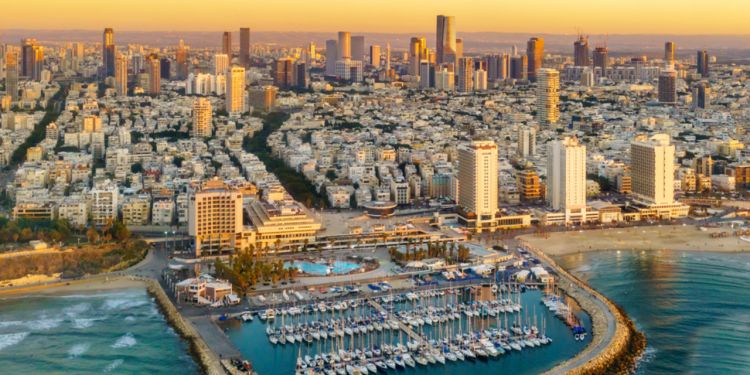
The country is situated along the Mediterranean Sea and shares its borders with Lebanon to the northwest, Syria to the northeast, Jordan to the east, and Egypt to the south.
The country is densely populated
To give you an idea of Israel's size, let's compare: it is about 24 times smaller than France in terms of surface area. Its length from north to south measures approximately 470 kilometers, while its width ranges from 135 kilometers in the south to 20 kilometers in the north. To continue the comparison, the population of Israel is only around 7 times smaller than that of France. This population density is noteworthy, especially considering that a significant portion of the country's southern half consists of uninhabited desert areas.
The climate is warm but…
The climate and geography in Israel vary significantly from one region to another. In Eilat, located at the southernmost tip of the country, temperatures rarely drop below 21°C. This weather pattern is also observed in the Dead Sea region, located just 40 kilometers away from Jerusalem. In these areas, rain is relatively scarce, averaging only about 5 days per year. On the other hand, in certain parts of the country's northern regions, temperatures never rise above 22°C.
The country experiences abundant sunshine, even during winter when rainfall is minimal. From May to October, the weather is warm and dry without any rain. During the summer, the coastal towns can be extremely humid, making it challenging for people to find relief and sleep comfortably. The temperatures hardly decrease during this time. On the other hand, in desert towns like Beer-Sheva, Yeruham, Mitzpe Ramon, and also in Jerusalem, the nights are cooler and more enjoyable.
In winter, Jerusalem occasionally experiences snowfall, and the snow can completely transform the landscape for several days. This is such a rare and special event in the country that many people feel compelled to witness the snowy scenery in person. As a result, there are often massive traffic jams at the entrance to the revered city during these times — additionally, snow blankets Mount Hermon in the northern part of the country.
Israel abounds in verdant mountains
In Israel, famous for its Judea and Negev deserts, as well as its sandy beaches along the Mediterranean and Red Seas, mountains are also present. Towards the north, you'll find the Golan Heights, reaching altitudes of up to 1,000 meters. The Galilee mountain range is another prominent feature, with its highest peak, Mount Meron, rising to 1,200 meters. The valleys nestled between these two mountain ranges remain green throughout the year.
The official languages are Hebrew and Arabic
Israel's official national languages are Hebrew and Arabic. However, due to the diverse origins of the country's population, it is not challenging to find people who can communicate in other languages. For everyday tasks like asking for directions, shopping, or ordering in a restaurant, English is widely understood and spoken by most Israelis at a basic level, making communication easy for English speakers.
Russian speakers constitute around one-fifth of Israel's population, making Russian a prevalent language, if not officially recognized. In addition to Russian, there is a significant presence of French and French-speaking communities, especially in cities like Tel Aviv, Jerusalem, Netanya, and Ashdod. Moreover, you will find that signs all over the country are written in Latin characters, including those in stores and restaurant menus.
Several religious communities live side by side in Israel
Israel is a diverse and democratic country where various religious and secular communities, including Arab, Jewish, and Christian, coexist. However, it is not uncommon to find that these communities may not always communicate or fully understand each other. As a result, some individuals choose to stay within their neighborhoods or villages. Nevertheless, for tourists, the impression is often one of peaceful coexistence. The distinct dress styles of different communities can be quite striking and even picturesque.
Israel's coastlines are heavily populated, dotted with numerous towns, cities, and kibbutzim – originally agricultural communities – that have evolved and expanded over the years, diversifying their economic activities. Despite their socialist origins, most of these communities have adapted to the country's capitalist reality while retaining their community-based structures.
The family at the center of relations in Israel
The overall atmosphere in Israel is friendly, and often feels like a big family. Striking up conversations with strangers in cafes or streets is easy and familiar. However, it is worth noting that while warm-hearted and friendly when in the right mood, Israelis tend to have a hot-tempered nature overall. This aspect is particularly noticeable on the roads, where the honking of car horns is quite frequent.
The cost of living is high in Israel
Living in Israel can be expensive, especially in major cities. Everyday necessities like food, clothing, and housing demand a significant portion of the budget. Therefore, it's advisable to be mindful of expenses, especially during the initial days of settling in.
Israel is surrounded by three seas
Israel is surrounded by three seas: the Mediterranean, the Red Sea, and the famous Dead Sea, also known as the Salt Sea. The Dead Sea is an extraordinary natural wonder as it lies 434 meters below sea level, making it the lowest point of land on Earth. Due to its high salt concentration, diving into its water is not recommended. Instead, visitors can experience a unique sensation by lying on the surface and effortlessly floating, almost like floating on an air mattress. The mineral-rich mud found in the Dead Sea is renowned for its therapeutic properties, and tourists often indulge in covering their bodies with it.
Apart from the three seas, Israel also boasts an inland sea in the country's northern part: Lake Tiberias, also known as the Sea of Galilee. According to the New Testament, this legendary lake, situated 202 meters below sea level, was the site of a miraculous catch by Jesus' disciples and where Christ famously walked on water. Today, the lake's surroundings are dotted with historical, religious, and tourist attractions, making it a significant destination for visitors. The shores of Lake Tiberias are also home to essential farming communities and fishing enterprises.
Israel is the birthplace of the greatest religions
Israel holds the distinction of being the birthplace of several major world religions. This sacred land hosts significant holy sites that Judaism, Christianity, and Islam revered. For Jews, it is considered the Promised Land, with iconic destinations like Jerusalem, the Western Wall (Wailing Wall), and the Temple Mount. For Christians, Israel holds immense spiritual importance as the sacred land where Jesus Christ was born, crucified, and resurrected, with revered sites like Bethlehem and the Holy Sepulchre. For Muslims, the Al-Aqsa Mosque in Jerusalem is the third holiest site after Mecca and Medina. The rich tapestry of religious diversity has deeply influenced Israel's history and culture, making it a place of profound significance for millions of believers worldwide.
We do our best to provide accurate and up to date information. However, if you have noticed any inaccuracies in this article, please let us know in the comments section below.








